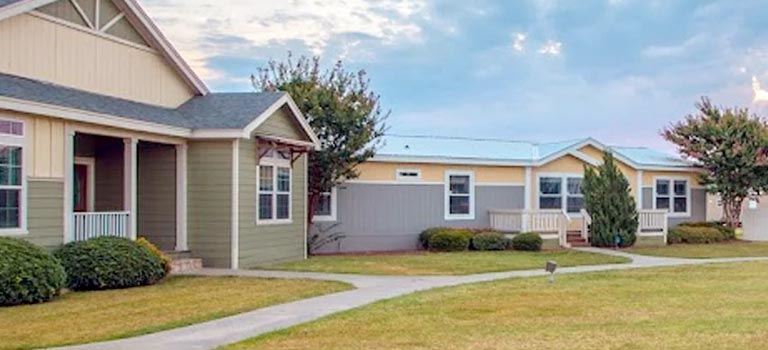Modular housing is assembled on a permanent foundation or slab, following local building codes for site-built homes. However, the construction of manufactured housing, which is also factory-built, follows the U.S. Department of Housing and Urban Development (HUD) standards.
They may have different setups, but both manufactured and modular housing offer affordable housing options in a wide variety of ways to meet your needs. Depending on the type of loan that makes sense for your situation, financing manufactured homes can be quicker and easier than traditional mortgages.
How Does the Financing Vary for Manufactured Homes?
Manufactured housing is financed differently from traditional site-built homes, typically financed for 30 years. Loan options include chattel loans for just the home or more traditional loans that wrap inland, garages, decks, and other improvements. Chattel loans are shorter, often with terms of 15 to 25 years, and may have higher interest rates than conventional loans. However, they are often still affordable due to their smaller loan balances.
Chattel loans don’t require appraisals and work well for homes on a leased lot or family-owned land. Loans that include land and improvements are similar to conventional mortgages.
As with all loans, there are credit score and income requirements, with more favorable terms given to those with higher credit scores and down payment funds. Special programs like VA home loans, FHA home loans, and Conventional loans are also worth exploring.
How Do I Become Qualified for a Manufactured Home Loan?
Ensuring you have a good credit score and a workable budget is the first step to financing a manufactured home. Once you’ve decided which type of housing to explore and the kind of financing you’d like, make sure you qualify. Include the home and any add-ons like land, decks, foundations, or garages. Take steps to check and improve your credit rating and pay down debts. Credit card balances compared to credit limits are a major factor in credit scores, as is making all payments on time.
Steps in the loan application process include:
- Make sure your credit score is in good shape. Higher credit scores lead to lower interest rates and easier qualifying. Check your credit report and credit score to make sure there aren’t any issues or errors. Lenders typically use one of three major credit bureaus when considering loan applications. The bureaus collect and maintain credit history and keep personal information like employers, addresses, and Social Security numbers. Bureaus also correct errors on reports. Credit history includes open and closed accounts, balances and limits, payment history, and public records like bankruptcies.
- Make sure the expected monthly payment and related expenses like utilities and lot rent fit into your budget. Review all income sources and your monthly bills and debt. Paying down credit cards and other debt improves credit scores and frees up money as debt levels decrease.
- Gather documents, including two years of tax returns, recent pay stubs, bank statements, and other asset documentation for savings and investment accounts.
- Learn about the type of financing you seek, whether it’s a loan for the home only or financing the land and other improvements. Check the terms, including loan limits, interest rates, closing costs, origination fees, funding fees, and credit score requirements. Check into special financing like FHA, VA, or a first-time homebuyers program for your local area.
- Select a lender specializing in financing manufactured and modular housing and that offers special financing options like FHA or VA home loans that help families through government guarantees that bring interest rates and fees down.
- Become prequalified for a loan. Ensure your application is complete and that you meet credit and income requirements.
- Choose a real estate agent or manufactured housing sales representative who will be able to help you find a home (and possibly land for it) and begin home shopping.
Could I Benefit From Special Financing?
Specialty lenders can find financing options that meet your needs and budget for a manufactured or modular housing purchase. Options are abundant. Chattel loans, mortgages that include land, and government-backed options like FHA, and VA can provide economical alternatives that match your budget.
Government-Backed Loans
Government-backed loans save money through reduced interest rates, fees, and down payments, but they carry conditions. Income, military veteran status, and other factors affect qualification, and restrictions like the inability to rent out properties exist. Larger homes may exceed loan caps for some programs, while older homes may not qualify for financing.
- FHA loans are available for financing or refinancing manufactured homes with terms of up to 30 years with low down payments and loosened credit restrictions. They cover the house and land. FHA loans are for primary homes only, and they can be extended to 30 years for homes with land. Income limits don’t exist for FHA loans, but mortgage loans amounts are capped.
- VA loans are available to qualified veterans, their spouses, and other beneficiaries for their primary residences. The loans offer up to 100 percent financing on most modular homes and 95 percent financing on manufactured homes. As with any government-backed loan, those eligible for VA loans apply through private lenders. VA loans have funding fees from about 1.4 to 3.6 percent of the purchase price. Applicants for VA loans need to have a Certificate of Eligibility before approaching a lender.
Like manufactured and modular housing, loans also come in many forms and sizes. Contact Cascade to speak with a manufactured home loan specialist who can help you find the best financing option for your housing needs. Also, you can complete the process to become prequalified through our website.

